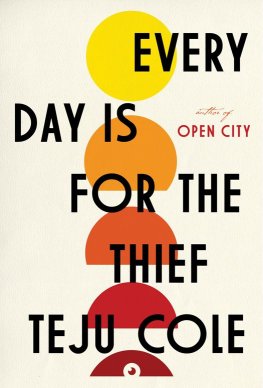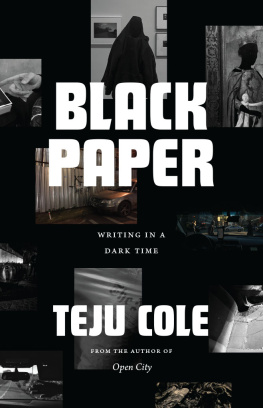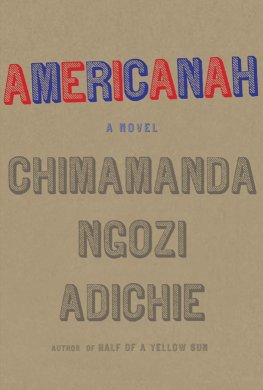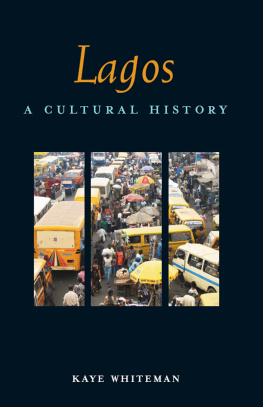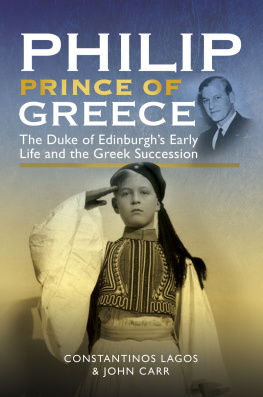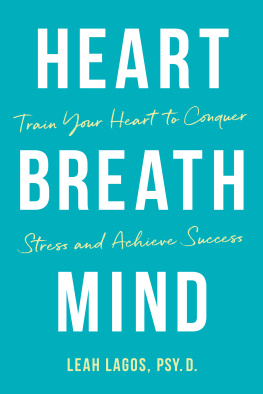Teju Cole
Every Day Is for the Thief
for Karen
and for my parents,
and Jeremy and Bibi
The window was one of many,
the town was one. It was the only one,
the one I left behind.
Maria Benet, Mapmaker of Absences
Ojo gbogbo ni tole, ojo kan ni tolohun.
Every day is for the thief, but one day
is for the owner.
Yoruba proverb

I wake up late the morning Im meant to go to the consulate. As I gather my documents just before setting out, I call the hospital to remind them I wont be in until the afternoon. Then I enter the subway and make my way over to Second Avenue and, without much trouble, find the consulate. It occupies several floors of a skyscraper. A windowless room on the eighth floor serves as the section for consular services. Most of the people there on the Monday morning of my visit are Nigerians, almost all of them middle-aged. The men are bald, the women elaborately coiffed, and there are twice as many men as there are women. But there are also unexpected faces: a tall Italian-looking man, a girl of East Asian origin, other Africans. Each person takes a number from a red machine as they enter the dingy room. The carpet is dirty, of the indeterminate color shared by all carpets in public places. A wall-mounted television plays a news program through a haze of static. The news continues for a short while, then there is a broadcast of a football match between Enyimba and a Tunisian club. The people in the room fill out forms.
There are as many blue American passports in sight as green Nigerian ones. Most of the people can be set into one of three categories: new citizens of the United States, dual citizens of the United States and Nigeria, and citizens of Nigeria who are taking their American children home for the first time. I am one of the dual citizens, and I am there to have a new Nigerian passport issued. My number is called after twenty minutes. Approaching the window with my forms, I make the same supplicant gesture I have observed in others. The brusque young man seated behind the glass asks if I have the money order. No, I dont, I say. I had hoped cash would be acceptable. He points to a sign pasted on the glass: No cash please, money orders only. He has a name tag on. The fee for a new passport is eighty-five dollars, as indicated on the website of the consulate, but it hadnt been clear that they dont accept cash. I leave the building, walk to Grand Central Terminal, fifteen minutes away, stand in line, purchase a money order, and walk the fifteen minutes back. It is cold outside. On my return some forty minutes later, the waiting room is full. I take a new number, make out the money order to the consulate, and wait.
A small group has gathered around the service window. One man begs audibly when he is told to come back at three to pick up his passport:
Abdul, I have a flight at five, please now. Ive got to get back to Boston, please, can anything be done?
There is a wheedling tone in his voice, and the feeling of desperation one senses about him isnt helped by his dowdy appearance, brown polyester sweater and brown trousers. A stressed-out man in stressed-out clothes. Abdul speaks into the microphone:
What can I do? The person who is supposed to sign it is not here. Thats why I said come back at three.
Look, look, thats my ticket. Abdul, come on now, just look at it. It says five oclock. I cant miss that flight. I just cant miss it.
The man continues to plead, thrusting a piece of paper under the glass. Abdul looks at the ticket with showy reluctance and, exasperated, speaks in low tones into the microphone.
What can I do? The person is not here. Okay, please go and sit down. Ill see what can be done. But I cant promise anything.
The man slinks away, and immediately several others rise from their seats and jostle in front of the window, forms in hand.
Please, I need mine quickly too. Abeg, just put it next to his.
Abdul ignores them and calls out the next number in the sequence. Some continue to pace near the window. Others retake their seats. One of them, a young man with a sky-blue cap, rubs his eye repeatedly. An older man, seated a few rows ahead of me, puts his head into his hands and says out loud, to no one in particular:
This should be a time of joy. You know? Going home should be a thing of joy.
Another man, sitting to my right, fills out forms for his children. He informs me that he recently had his passport reissued. I ask him how long it took.
Well, normally, its four weeks.
Four weeks? I am traveling in less than three. The website assures applicants that passport processing takes only a week.
It should, normally. But it doesnt. Or I should say, it does, but only if you pay the fee for expediting it. Thats a fifty-five-dollar money order.
Theres nothing about that on the website.
Of course not. But thats what I did, what I had to do. And I got mine in a week. Of course, the expediting fee is unofficial. They are crooks, you see, these people. They take the money order, which they dont give you a receipt for, and they deposit it in the account and they take out cash from the account. Thats for their own pockets.
He makes a swift pulling motion with his hands, like someone opening a drawer. It is what I have dreaded: a direct run-in with graft. I have mentally rehearsed a reaction for a possible encounter with such corruption at the airport in Lagos. But to walk in off a New York street and face a brazen demand for a bribe: that is a shock I am ill-prepared for.
Well, Ill insist on a receipt.
Hey, hey, young guy, why trouble yourself? Theyll take your money anyway, and theyll punish you by delaying your passport. Is that what you want? Arent you more interested in getting your passport than in trying to prove a point?
Yes, but isnt it this casual complicity that has sunk our country so deep into its woes? The question, unspoken, hangs in the air between me and my interlocutor. It isnt until past eleven that my number is finally called. The story is exactly as he has put it to me. There is an expediting fee of fifty-five dollars in addition to the actual eighty-five dollars that the passport costs. The payment has to be in two separate money orders. I leave the building for the second time that morning, to go and buy another money order. I walk quickly, and am exhausted by the time I return at a quarter to twelve, fifteen minutes before the closing of the window. This time, I dont take a number. I barge my way to the window and submit my form with the required fees. Abdul tells me to pick my passport up in a week. He gives me a receipt only for the original fee. I take it mutely, fold it up, and put it in my pocket. On my way out, next to the elevators, theres a partially torn sign that reads: Help us fight corruption. If any employee of the Consulate asks you for a bribe or tip, please let us know.
There is no number or email address appended to the note. In other words, I can inform the consulate only through Abdul or one of his colleagues. And its unlikely that they are the only ones on the take. Perhaps thirty or thirty-five dollars of the expediting fee is going to someone over Abduls head. I catch the look on Abduls face as I exit the room. He is absorbed in assisting other applicants. It is a farce, given a sophisticatedno cash pleasesheen.
It is early evening when the aircraft approaches the low settlements outside the city. It drops gently and by degrees toward the earth, as if progressing down an unseen flight of stairs. The airport looks sullen from the tarmac. It is named for a dead general, and is all that is worst about the architecture of the seventies. With its shoddy white paint and endless rows of small windows, the main building resembles a low-rent tenement. The Air France Airbus touches down and glides onto the tarmac. Relief enters the holds and cabin with the inward-rushing air. Some of my fellow passengers break into applause. Soon, we are trooping out of the craft. A woman weighed down with bags tries to barge through the aisle. Wait for me, she cries out to her travel companion, loud enough for everyone to hear, Im coming. And I, too, experience the ecstasy of arrival, the irrational sense that all will now be well. Fifteen years is a long time to be away from home. It feels longer still because I left under a cloud.

